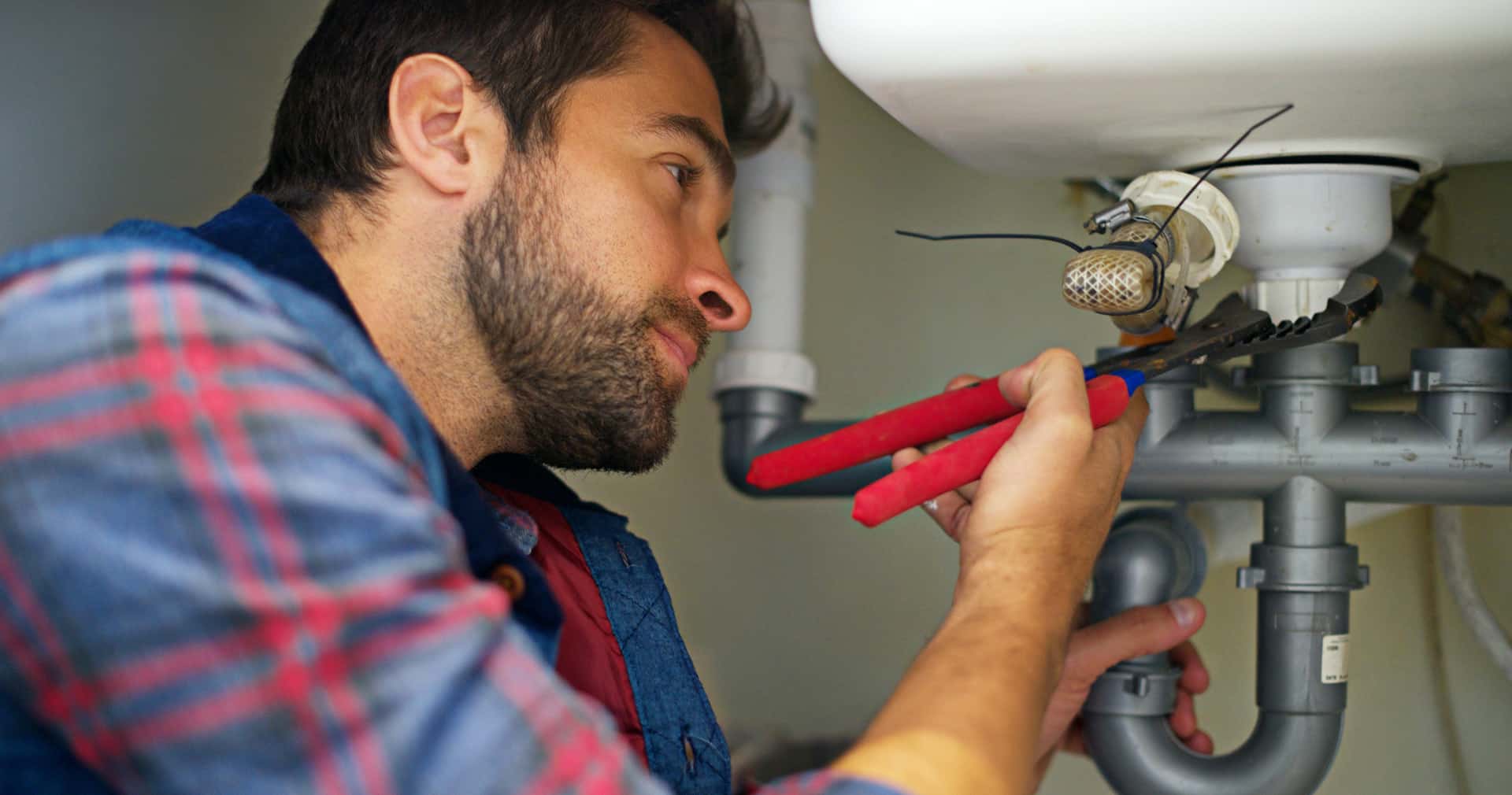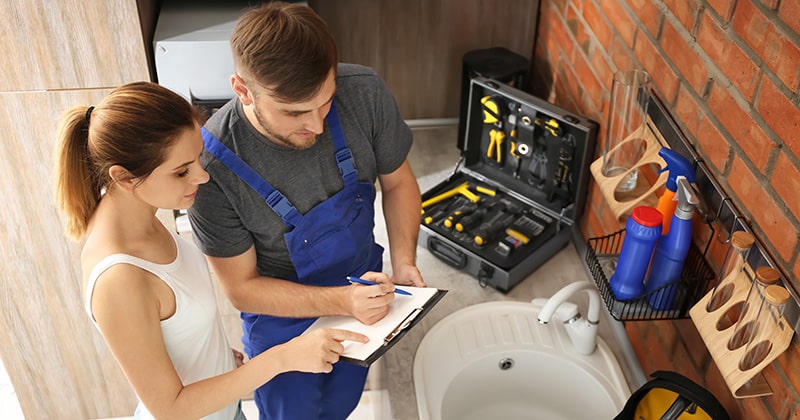
If you’ve wondered how to start a plumbing business, this article is for you. It walks you through all the steps you need to take.
You’ll also get an overview of the plumbing industry and why it’s so promising today. And read tips you can use right away when building your plumbing startup.
Why Start a Plumbing Business?
It might surprise you to learn that plumbing is a growth industry right now. Why? There are multiple reasons:
- A few decades ago, students focused on four-year college programs, leaving trade fields wanting for workers.
- Baby boomers, who made up a large portion of the plumbing profession, are retiring in large numbers.
- Homes and businesses built in the last 20-40 years are reaching an age where they need plumbing upgrades.
- Television shows and social media have made property owners more interested in remodeling.
- Kitchen and bath upgrades—where plumbing is critical—continue to add value to residential properties.
- Plumbing technology has become more advanced, and specialists are needed for new areas.
The last point is an important one. There is a new focus on green technology to reduce freshwater use. Many appliances now connect to the Internet of Things (IoT). And other recent innovations increase the demand for plumbers, such as:
- Water filtration systems for drinking, washing, and irrigation
- Hands-free technology and germ-resistant surfaces
- Tiny homes and plumbing systems for small spaces
- Leak detection, fire suppression, and other safety systems
Demand for plumbers was predicted in 2021 to accelerate for at least the next five years. The U.S. Bureau of Labor Statistics (BLS) predicted a 5% increase in plumber jobs during the 2020s.
This means there are many opportunities for people interested in starting a plumbing business. You might be looking for a stable first career. Or perhaps you work as a handyman and want to specialize or add to your services. Better yet, you might already be working for a plumber and want to start your own business.
You could work as a residential plumber or take on commercial clients. And there are plumbers who stay busy just working with property management companies, apartment complexes, developers, and real estate companies.
Whether you enjoy quick fixes, renovations, or new construction projects, there’s room for you in the industry.
Working for yourself has three prime benefits over working for someone else:
- You can move to where there is a demand for your desired work.
- You have more freedom to set your own schedule and work culture.
- The potential exists for uncapped income through specialization and expansion.
Of course, you need to approach any career plans methodically. To start a plumbing company, there are steps you need to follow for legal compliance and plain old good business sense.

11 Key Steps to Start Your Own Plumbing Business
This section reviews the steps required to start a plumbing business. You can use it as a checklist to stay on track.
As state laws vary, you might have to do some of these tasks differently depending on where you live. But if you accomplish all of them, you’ll set yourself up well for stability and future growth.
RELATED ARTICLE
How to Grow a Plumbing Business
Step 1: Get Any Necessary Training and Experience
To get licensed as a plumber in most states (see below), you must undergo some training. Many plumbers attend technical college to get this education, but some apprentice on the job.
You might have to jump between steps here. First, see what your state or city requires to work for yourself. Then, fill in training gaps as needed.
If you’re already working as a plumber or even licensed, your training requirements will likely involve continuing education related to your desired market (more in Step 3). You’ll want to learn how to install or repair plumbing components for the types of clients you intend to work with.
To start your own plumbing business, you may also have to be a master plumber or a plumbing contractor. This entails having a certain number of hours under your belt. You might also have to pass a state exam.
Step 2: Understand the Demands of Owning a Business
It’s smart at this time to sit down and review what starting a plumbing business will mean in terms of time, energy, and sacrifice.
If you talk to other plumbers who work for themselves, they’ll have good advice for you. For example, you can expect to put in long hours at the start. Not only will you be working all day providing services, but you’ll also be spending time at night to bring in customers and handle operations.
Be prepared to forego much of your free time for the first few years. You might even need to work part-time at another job to help make ends meet. That’s an investment, though, in earning more later.
Step 8 involves obtaining funding for your business, which you’ll know more about after you write your business plan (Step 4). But for now, start thinking about how you intend to fund your business.
Unless you have a large savings account or vast lines of credit, you’ll probably need a business loan. So start establishing a solid relationship with your bank or credit union. It’s a good idea to start a savings account. However, you won’t be able to open a business account until you register your business (Step 5).
Pay down your credit card balances to raise your credit score. Until you’ve been in business for a while, lenders will use your personal score when making decisions about your business.
Step 3: Analyze the Plumbing Market
Now is the time to think about what kind of plumbing you want to do. At the start of this article, you read about different business models and plumbing specialties. Do any of those appeal to you?
If you don’t plan to move, your business will largely be dictated by the demand in your area. If you’re located in a big city, there are more plumbers. But there’s also more room to specialize, such as working on multi-unit properties or doing luxury home makeovers.
If you live in a rural area, expect to see more demand for general services, such as:
- Repairing broken pipes
- Leak detection
- Fixing clogged drains
- Repairing or installing boilers
- Installing new fixtures
- Connecting appliances
- Pipe relining and sewer repair
Are you in a college town? There may be opportunities to serve dormitories and student rental units.
You can branch out more once you gain experience and establish your reputation. You might become a water heater expert or work with a builder who constructs new homes.
No matter where you live, it’s expected—especially for new plumbers—to offer 24/7 emergency service. This lets you pick up new customers desperate for help when other plumbers don’t answer the phone or are already booked.
To help with this, you’ll probably want a partner or employees (Step 10), so you’re not on call every minute of every day. You may also need to hire an answering service for nighttime and weekend calls. Some service business management software might also help with this.
Step 4: Write a Business Plan
At this point, it’s time to create a business plan. This written document serves as a roadmap for your business as it starts up and grows.
Most lenders also require it if you intend to apply for a business loan. They want to see that you have a high chance of doing well and won’t default on your loan.
What does a business plan include?
- Executive summary with an overview of the business
- Market analysis of clients and competition
- Company structure, including the number of employees
- Services offered and prices to be charged
- Financial statements for now and the future
- Short-term and long-term company goals
You will likely need the help of a CPA (certified public accountant) for the financial documents, as you’ll need a profit-and-loss statement. You’ll also need information about what you need to earn to break even and turn a profit.
FROM ONE OF OUR PARTNERS
How to Create a Business Plan for a Plumbing Company

Step 5: Set Up Your Business Corporate Structure
How do you plan to structure your company? An accountant or an attorney can help you with this.
You might be a sole proprietor or a partnership. Or you could incorporate as an LLC (limited liability company) or an S corp. Each has different pros and cons, including tax rules.
You register your corporate status with the appropriate office in your state. There’s a fee involved, which you usually have to pay annually.
Step 6: Purchase Professional Insurance
To operate legally in many states, you have to carry insurance for plumbers, especially liability coverage. Even if it’s not required, it’s smart to get this protection anyway.
Without liability insurance, an accident at a job site or damage to a client’s property could result in you having to pay for it out of your own pocket. After a serious incident, that could be enough to put some plumbers out of business.
Other types of insurance you’ll want to purchase include:
- Commercial auto for any vehicles driven for work purposes
- Workers’ compensation for employees injured on the job
- Inland marine, if you transport expensive items for customers
- Property insurance for equipment and tools (or your office)
- Cyber insurance if you intend to take online payments
- Surety bonds, if your state requires this extra coverage
- Umbrella insurance to increase your liability protection
Step 7: Get Licensed as Required by Your State or Municipality
Once you have the above items checked off, you can apply for a state license if one is required where you live. Nearly all states have licensing requirements for plumbers.
Some cities and counties also have their own licensing requirements that may be stricter than the state codes. Also, many states have different licensing requirements based on your level of practice.
For instance, a journeyman plumber typically works for an employer with a higher licensing status. A master plumber is a more experienced plumber who can own a business and employ other plumbers.
Some states have an additional category called a plumbing contractor. This usually means you offer a more comprehensive range of services that overlap with general contractors. Some states have special licenses for doing certain types of work, like installing or repairing items that use natural gas or propane.
Step 8: Obtain Any Necessary Funding
As mentioned above, most people need outside funding to start a plumbing business. The easiest way to get this is to obtain a loan and/or line of credit from your bank or local credit union.
You will be asked for your business plan, articles of incorporation, license, and other documents you need to operate. At this point, you can open a business checking account, which you should keep separate from your personal accounts.
Step 9: Purchase Required Tools and Equipment
Depending on the type of plumbing you do, you’ll need a variety of tools and equipment, like:
- Wrenches, pliers, and small hand tools
- Drain snakes to remove clogs
- Flashlights
- Ladder
- Saws for cutting pipe
- Level
- Drill
- Soldering torch
- Buckets
- Small hardware, plumber’s tape, etc.
- Toolboxes
You may need more expensive equipment, too, like cameras for in-line imaging.
Do you own a truck or van? If not, you may need to buy or lease a business vehicle.

Step 10: Hire Workers as Needed
If you intend to hire assistants, now is the time. Even if you don’t need another plumber on staff, you may want someone to help with phone answering or accounting.
You can advertise for help on local social media and with area technical schools or plumbing training programs. Remember to check references and perform a background check, as your workers will be visiting other people’s properties.
Step 11: Start a Marketing Campaign
Finally, you need to advertise your business so customers can find you. Your marketing campaign will consist of (at minimum):
- Building an SEO (search engine optimized) website
- Setting up professional social media accounts
- Printing business cards and brochures
- Advertising on social media or in local papers
- Creating accounts with online review sites
- Joining organizations for networking, like the Chamber of Commerce
Once you have a few customers, you can leverage that to generate more clients. Ask them to leave positive reviews for you online and to mention your business to friends and family who are looking for a plumber.
Marketing is like rolling a snowball to make a snowman. It’s hard to start it at first, but you can build on your previous results once you get going.
Use your unique selling proposition (USP) to stand apart from the competition. That’s what makes your business different from others in the area. It might be your training, experience, specialty, or problem-solving skills.
Don’t assume that you always have to be the cheapest plumber in town to get customers. This doesn’t always work, especially when turning a profit with your business.
RELATED ARTICLE
8 Ideas to Choose the Perfect Plumbing Company Name
Top Tips for Aspiring Plumbing Business Owners
Here are a few final tips for starting your business:
- Connect with other professionals (noncompetitors) who may need a plumber. This includes general contractors, real estate agents, home builders, and property managers. They can be gold when it comes to getting customer leads.
- Shop around on insurance, as prices vary. Independent agents typically have more choices at different price points. You can save by bundling policies with one agent/carrier.
- Use short billing cycles to get money flowing in swiftly. Ask customers to pay on the spot using online payments. Avoid net 30 or net 60 invoices in place of “payable on receipt” or “due in 7 days.”
- Learn how to write accurate job quotes quickly. You don’t want to underestimate work, nor do you want to tie up billable hours with this task. To simplify the process, use software designed to help plumbers manage their businesses.
FROM ONE OF OUR PARTNERS
The Importance of Customer Service in Home Services: Enhancing the Journey to Customer Satisfaction
Related Posts
Stay Informed
Get the latest news and insights plus, Service Fusion offers and updates.Thank you for your submission.
SHARE